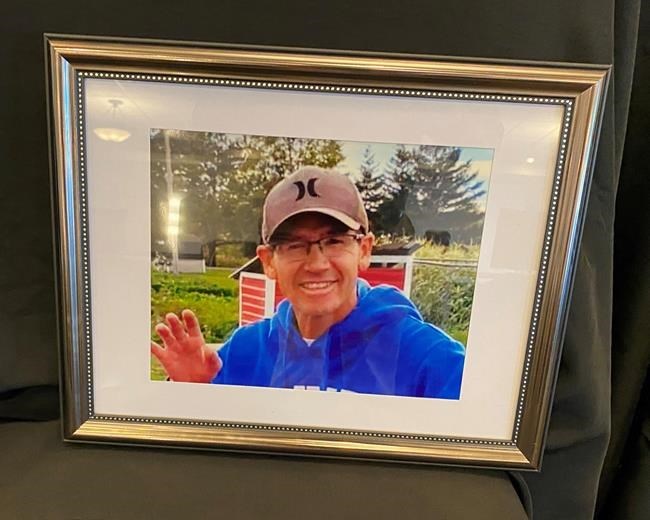MIRAMICHI, N.B. — Rodney Levi, an Indigenous man killed by the RCMP in 2020, said police would have to shoot him if they wanted him to drop his knives, an officer testified Monday at a coroner's inquest.
RCMP Const. Scott Hait, who shot and killed Levi on June 12, 2020, was the first officer on the scene in Sunny Corner, N.B., after police received a complaint about a disturbance in a home. Hait told a coroner's jury in Miramichi, N.B., that while driving to the scene, he was told there was an unwanted person at the residence who had knives and that so far, no one had been hurt.
Hait said he was also told the unwanted person was Levi. Hait said he had not met the man prior to that day but had recognized the name because Levi had been involved in a recent case about a break and enter.
The officer said when he arrived, Levi, 48, was standing on a deck at the home wielding two knives. He said he asked Levi if he wanted to harm himself or was suicidal.
"He said yes," Hait told the five-member coroner's jury.
The officer said he told Levi he would be able to get him some help and told him to surrender the two knives. He said Levi responded that he had found the knives on the side of the road.
Hait said Levi was responding to his questions, but that every time the conversation moved to the knives, Levi stopped answering.
A second officer, Const. Justin Napke, arrived to the scene and also instructed Levi to drop the knives. Hait said the man refused.
He said Napke deployed his Taser, but it had no effect. Hait said Napke tried to electroshock the man again. Hait said he drew his pistol, and he said Levi began holding the knives in front of himself.
He said Levi then blurted, "You're going to have to put a bullet in me."
Levi was given a third jolt from the Taser, Hait said. The man flinched, dropped one knife, then picked it up and started to hold both of them in a threatening manner, Hait said.
"He started to step toward me," Hait told the inquest. "I was fearful for my life and those of the people around me."
Hait said he fired two shots, three to five feet away from Levi. Testimony from a coroner last week said those shots were fatal.
Napke told the court he was badly shaken by the incident and only returned to active duty two weeks ago.
Neither officer was wearing a body camera.
Earlier Monday, the inquest heard the 911 calls and police transmissions from the day of the shooting.
Two members of the MacLeod family, who lived at the home where the shooting occurred, are heard telling a 911 dispatcher that Levi appeared to be under the influence of something and was armed with two kitchen knives.
The inquest also heard police radio transmissions of an officer saying "shots fired, shots fired" and "we need medics here now."
The shooting was investigated by Quebec's police watchdog, the Bureau des enquêtes indépendantes, which submitted a report to New Brunswick prosecutors in December. The BEI probed the killing because New Brunswick doesn't have an independent police watchdog.
New Brunswick prosecutors determined the officers on the scene believed Levi was using force against them and were justified in shooting him.
On Monday, New Brunswick and Nova Scotia announced they had reached an agreement in principle that would allow Nova Scotia’s Serious Incident Response Team (SiRT) to act as the police oversight body for both provinces. SiRT is an independent agency that has a mandate to investigate matters such as death, serious injury and sexual assault involving the police.
Levi's killing came days after an Edmundston, N.B., police officer fatally shot Chantel Moore, a 26-year-old Indigenous woman, during a wellness check. The two killings sparked anger in the province's Indigenous community.
A coroner's inquest does not assign blame but issues recommendations intended to help prevent a death under similar circumstances in the future.
The inquest is expected to wrap up Thursday.
This report by The Canadian Press was first published Oct. 4, 2021.
Kevin Bissett, The Canadian Press




